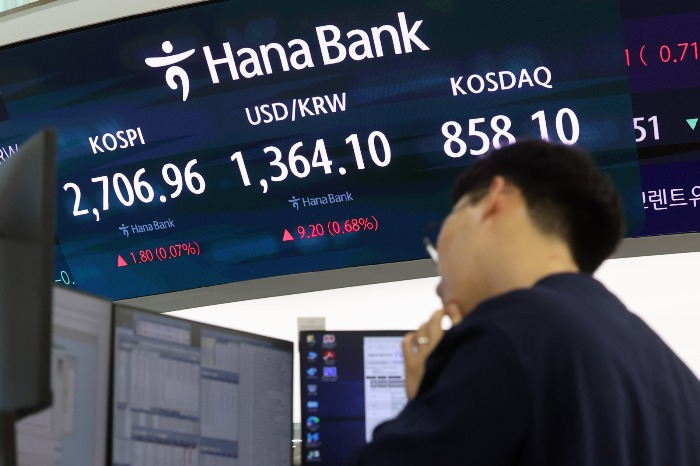Won at 17-month low vs dollar on reduced US rate cut bets
US inflation data prompted market bets on later-than-expected interest rate cuts
By Apr 11, 2024 (Gmt+09:00)
Alibaba eyes 1st investment in Korean e-commerce platform


Blackstone signs over $1 bn deal with MBK for 1st exit in Korea


Korea's Lotte Insurance put on market for around $1.5 bn


OCI to invest up to $1.5 bn in MalaysiaŌĆÖs polysilicon plant


NPS loses $1.2 bn in local stocks in Q1 on weak battery shares



The Korean won weakened to its lowest level in 17 months against the dollar on Thursday, after stronger-than-expected US inflation data dented hopes that the Federal Reserve might end its tightening cycle anytime soon.
The won ended local trade at 1,364.1 per dollar, a 0.7% retreat from TuesdayŌĆÖs finish. That marked its weakest closing level since Nov. 10, 2022, when it finished at 1,377.5.
South KoreaŌĆÖs financial markets, including the foreign exchange market, were closed on Wednesday for parliamentary elections, in which the opposition Democratic Party scored a landslide victory against the ruling People Power Party.
The Korean currency opened at 1,365.0 to the greenback and hovered between 1,361.8 and 1,365.0 during the session. The intra-day level was also its weakest point in 17 months since touching 1,378.5 on Nov. 10, 2022.
The US consumer price index (CPI), a measure of inflation, added 3.5% in March from the same month last year, according to data released by the Bureau of Labor Statistics. The figure compared with FebruaryŌĆÖs gain of 3.2% and marked the highest annual increase in six months.
The CPI advance beat the FedŌĆÖs 2% target and signaled the Fed will likely maintain its high rates longer than expected.
Following a string of rate hikes since March 2022, US interest rates have remained in the 5.25%-5.55% range since July 2023, their highest level in over two decades.
In South Korea, hopes for rate cuts are waning as well. The countryŌĆÖs headline inflation stayed above 3% in March for the second consecutive month, reinforcing market expectations that the Bank of Korea would maintain its tightening cycle for a while.
Meanwhile, the Korean currency steadied at 8.91 per Japanese yen on Thursday afternoon, compared to 8.92 on Tuesday.
Write to Jin-Gyu Kang at josep@hankyung.com
Yeonhee Kim edited this article.┬Ā
-
 EconomyKoreaŌĆÖs rate cut hope wanes with inflation above 3% in March
EconomyKoreaŌĆÖs rate cut hope wanes with inflation above 3% in MarchApr 02, 2024 (Gmt+09:00)
3 Min read -
 Foreign exchangeS.KoreaŌĆÖs foreign currency deposits fall as dollarŌĆÖs strength seen limited
Foreign exchangeS.KoreaŌĆÖs foreign currency deposits fall as dollarŌĆÖs strength seen limitedFeb 23, 2024 (Gmt+09:00)
1 Min read -
 EconomyKoreaŌĆÖs consumer inflation reaches 3.6% in 2023 on high utilities
EconomyKoreaŌĆÖs consumer inflation reaches 3.6% in 2023 on high utilitiesDec 29, 2023 (Gmt+09:00)
2 Min read -
 Foreign exchangeWon strengthens past 1,300 mark vs dollar on short-sale ban
Foreign exchangeWon strengthens past 1,300 mark vs dollar on short-sale banNov 06, 2023 (Gmt+09:00)
2 Min read -
 Foreign exchangeDollar/won in wildest swing in 13 yrs despite intervention
Foreign exchangeDollar/won in wildest swing in 13 yrs despite interventionOct 06, 2023 (Gmt+09:00)
3 Min read -
 Foreign exchangeKoreansŌĆÖ US dollar selling spree continues in anticipation of weaker USD
Foreign exchangeKoreansŌĆÖ US dollar selling spree continues in anticipation of weaker USDSep 19, 2023 (Gmt+09:00)
2 Min read -
 Foreign exchangeKorean won near 5-month low despite weak dollar; outlook dark
Foreign exchangeKorean won near 5-month low despite weak dollar; outlook darkApr 21, 2023 (Gmt+09:00)
4 Min read


